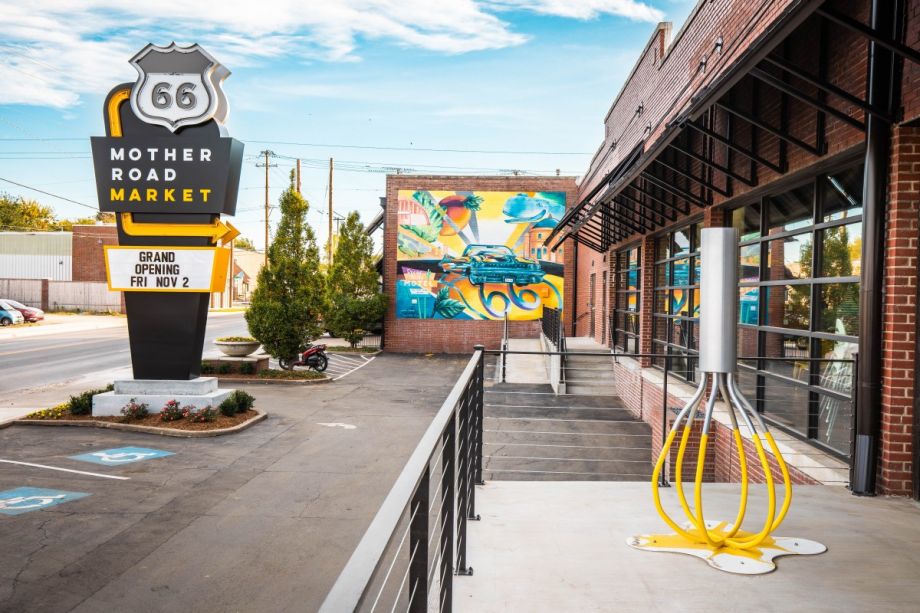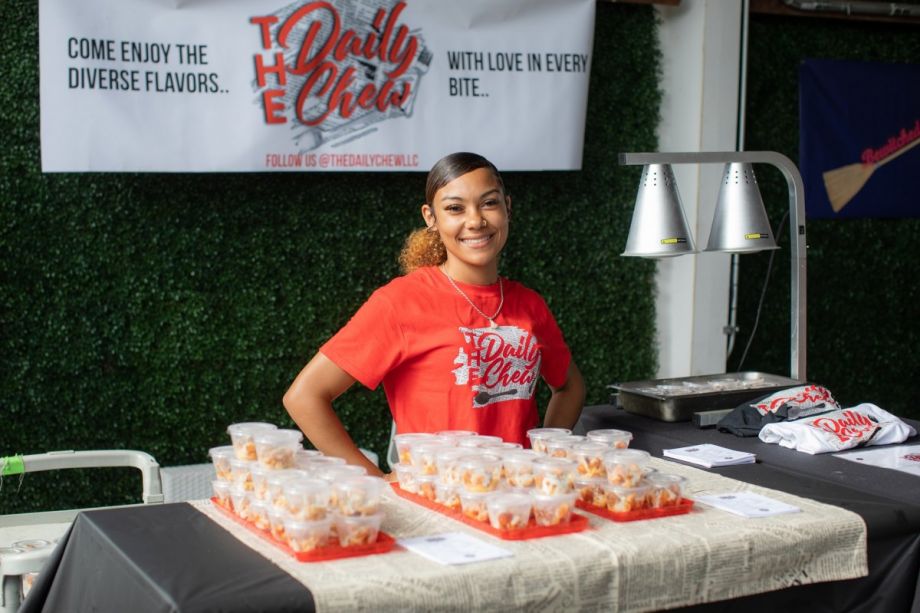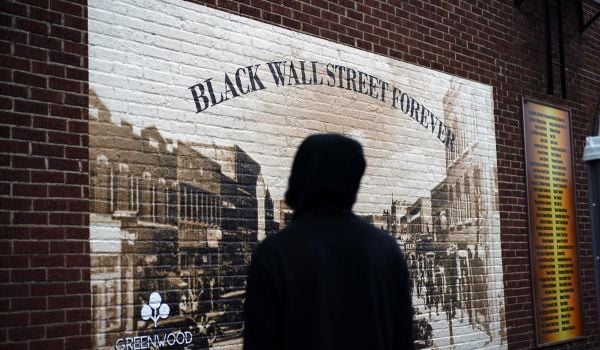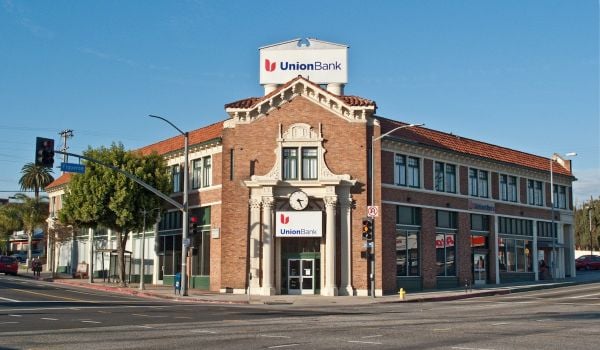Sharlyn Pierce first toured Mother Road Market in February 2021.
Constructed in 1939, the building started out as a grocery distribution warehouse, strategically located on what at the time was the main road through Tulsa and through much of the United States — historic Route 66, stretching from Chicago to Santa Monica. Inside the building today there’s a 9-hole miniature golf-course that lets you play your way from one end of the highway to the other.
“Mother Road” is also a historic nickname for Route 66. The tour of Mother Road Market came at the beginning of a new journey for Pierce. She‘d previously left business school, disillusioned with the impractical nature of the experience. “I wanted to be a little more hands on,” Pierce says. “I just couldn’t do what I wanted to do within that major and within that school.”
In between shifts at a big box retailer, Pierce started making and selling plates out of her home kitchen, pre-ordered by friends and family. Catfish platters, buttermilk chicken — soul food she’d grown up cooking with her grandmother in Tulsa.
“Cooking brings people together,” Pierce says. “I want people to feel the love I put into my food. And it’s not a lot of love in this world.”
She started looking into brick-and-mortar spaces around town, and that’s when her sister mentioned Mother Road Market. It opened in November 2018, claiming to be Oklahoma’s first nonprofit food hall. Pierce stopped by, talked to one vendor, and was impressed. It would be worth the price she would be paying in rent, she says.
When Pierce inquired about renting out some space, she was told her business may not be quite ready yet, but was referred to the Kitchen 66 Launch Program — a kitchen incubator inside the market, funded by the Lobeck Taylor Family Foundation, which also owns and runs the market itself. Kitchen 66 brought Pierce in for the tour in February. She graduated from the program in the spring, and has since become a regular pop-up vendor at Mother Road Market. She recently acquired a truck that she plans to build out for her soul food business, called The Daily Chew.
“I have a lot of college students asking if I can pop up at their schools, and there’s a lot of festivals around Tulsa,” Pierce says. “I wanna be able to have a food truck and maybe a concessionary trailer… planning for a brick and mortar location after that. It’s really booming a lot around Mother Road Market.”
And that’s no coincidence. Mother Road Market is very much the centerpiece of an intentional strategy from the Lobeck Taylor Family Foundation along this particular stretch of historic Route 66 to revitalize it as an “inclusive destination” area, called the Tulsa Market District. Over 150 businesses have gone through the incubator program, helping to fill up Mother Road Market, and they’re starting to move out into locations in the neighborhood, too. It’s all part of a plan to revitalize a historic car-centric corridor into a more pedestrian- and transit-friendly district full of local businesses.
“Ideally we’ll have a pipeline where someone would enter Kitchen 66 or similarly situated retail program, develop or incubate their business, pop up at Mother Road Market, then hopefully sign a lease eventually at Mother Road Market,” says Elizabeth Frame Ellison, CEO of the Lobeck Taylor Family Foundation, which her parents established in 1997. “When they eventually outgrow that space they can grow into the Tulsa Market District where they can still benefit from the collection of local businesses that exist here.”
Known more for funding scholarships for local students or funding soup kitchens or homeless shelters — charitable work that is or was near and dear to their founders — small family foundations aren’t usually at the steering wheel of a placemaking effort like this. That journey started about a decade ago, when Frame Ellison took over the family foundation from her parents.
“Supporting accelerators or incubators is much more common than directly using real estate as an anchor supporting an ecosystem of entrepreneurs,” says Rodney Foxworth, executive director of Common Future, which advises smaller or family foundations across the country to find more creative ways to spend or invest their money. The Lobeck Taylor Family Foundation is doing both.

(Photo courtesy Mother Road Market)
The Lobeck Taylor Family Foundation is one of many family foundations that has gone through a generational shift in leadership, or will be going through it soon — there are at least 40,000 family foundations across the country, representing more than $294 billion in wealth.
The shift away from founding generations can lead to changes in focus. Eventually, family foundations tend to give less money away in their founder’s community because succeeding generations of trustees and board directors – typically including the original donors’ adult children, grandchildren or great-grandchildren – often have fewer and looser connections to the founder’s hometown, and probably live somewhere else, as reported last week in The Conversation.
In some ways, small family foundations can exemplify the worst of philanthropy, with founders or board directors disconnected from communities, making grant decisions based on theory or ideology that can change year to year, serving mostly as tax havens that occasionally mollify the egos or souls of the rich and powerful. But not all family foundations have to turn out that way.
When she took over her family foundation in 2009, Frame Ellison doubled down on Tulsa, but added a focus on entrepreneurship. One early grantee of hers was a startup pitch competition in partnership with a local university. In conjunction with that work, she commissioned a broader analysis of the Tulsa landscape for entrepreneurs — a scan of who else was supporting entrepreneurs, what kinds of support they offered and what kinds of businesses they were interested in supporting.
Frame Ellison says that analysis turned up a few institutions that were very interested in supporting startups with high-growth potential in “STEM” industries. In 2014, the Lobeck Taylor Family Foundation helped co-convene “Cultivate 918,” an informal network of food business entrepreneurs and artists that started meeting once a month. “Basically we got food and beer and let entrepreneurs talk to each other and talk to stakeholders about what they most needed from our community to succeed,” Frame Ellison says.
Between the analysis and the informal network discussions, Frame Ellison came to the conclusion that “there was a hole where people of color, women, entrepreneurs who didn’t have high growth-oriented tech businesses were really falling through the cracks because they didn’t have anyone to mentor them, support them and give them opportunities. That was really where Kitchen 66 came into existence.”
Frame Ellison had even tried herself, unsuccessfully, to start a cupcake business as a side hustle after law school. Even with all she had going for her — her family’s wealth (her father made his money in the car rental industry) and connections (her mother Kathy Taylor was mayor of Tulsa from 2006-2009), and her law degree, it still didn’t work out. That’s not necessarily surprising — 80 percent of food business startups do fail. But it didn’t stop her from believing in her food business or food businesses in general.
“I didn’t have the business background to build a successful food business and I couldn’t find anyone in the community who was willing to give me advice,” Frame Ellison says. “My food business did not make it, but I saw the opportunity to be that support for other people. And I like food in particular because I think it’s education agnostic and there are so many people in our community who have been justice-involved or don’t have a college degree and the food business is open and attainable for all different types of people.”
Kitchen 66 started out in a rented second-floor commercial kitchen in downtown Tulsa. Some food entrepreneurs just needed access to a licensed commercial kitchen, rented out hourly at affordable rates to fill out catering orders or prep for festivals and other community events. Some also wanted classes in the basics of running a food business. Kitchen 66 could offer all that and more.
Soon, Kitchen 66 was paying for a local farmers market stall, letting two incubator members at a time test out their offerings. But it wasn’t enough. The nonprofit took over a ground floor space below the commercial kitchen to launch a cafe where incubator members could rotate in and out as pop-ups.
“Operationally we were really nervous about that because it was a huge lift to take on,” Frame Ellison says. “But from the entrepreneurs perspective it was the most beneficial thing we could have done to help our entrepreneurs really live the life and walk the walk of food business owner and feel what it’s like to have too many orders and not enough staff or have a day when you don’t have as many sales as you expect to.”
And that still wasn’t enough. Kitchen 66 was churning out graduates from its incubator program faster than the Tulsa economy could find them places to take root and grow — and, Frame Ellison says, they liked being near each other, supporting each other and learning from each other.
Meanwhile, the city started talking (for the first time since 2005) about revitalizing areas along historic Route 66, which would include putting in wider sidewalks, bike infrastructure, and a new rapid bus transit line.
“I thought, great opportunity for us to really capitalize on an underutilized resource while supporting underestimated entrepreneurs to build an inclusive destination district that would really sort of set the tone for what placemaking could look like along Route 66,” Frame Ellison says.
Her family already owned the former grocery distribution warehouse, at the intersection of Route 66 and Lewis Avenue. Frame Ellison created an operating foundation — a second nonprofit entity separate from the original family foundation — and the family donated the building into it. This way, if Mother Road Market ever does start to turn a profit, those profits will go back into the building instead of going to the family or to the family foundation. It also makes it easier to hand the ownership of the property over to the community through a land trust or some kind of cooperative ownership structure, which Frame Ellison says she foresees doing someday.
The family foundation covered all of the costs to redesign and build out the space. For now it’s also covering any costs that can’t be covered out of rental income from vendors — costs that include property and sales taxes, which the market does still have to pay (it’s only exempt from federal taxation).
There are currently 17 food businesses and five retail businesses currently renting permanent spaces at Mother Road Market, which also has three pop-up spaces. If anyone moves out, there’s 150 and counting alumni from the Kitchen 66 Launch Program who can step right into their spot. Fifty of those alumni also actively rent the shared commercial kitchen at Mother Road Market. A majority of Kitchen 66 alumni are women, and the spring 2021 cohort of 9 were all women or people of color.
Frame Ellison is betting that Mother Road Market and Kitchen 66 can feed successful food and retail businesses that already have an affinity for the area into spaces within the Tulsa Market District. To help facilitate that, Frame Ellison says, she’s been cultivating relationships with commercial property owners in the district’s defined area, a one-mile stretch of Route 66 with Mother Road Market near the midpoint.
She counts around 100 separate commercial property owners in the area — one of them is her husband, Christopher Ellison, whose firm recently developed a row of retail spaces across Lewis Avenue from Mother Road Market. He’s currently developing a major project across Route 66 from the market, slated to have even more retail space as well as some housing.
“While the Lobeck Taylor Family Foundation and projects owned by Chris are kept intentionally separate, we have a shared interest and vision for the Tulsa Market District and revitalizing a historically underserved area,” Frame Ellison says.
One Mother Road Market tenant has already opened a second location in the Tulsa Market District.
“Our biggest concern and why we built a strategic plan around an inclusive destination district, is that when you start to see developments like Mother Road Market be as successful as it’s been, and it’s been a lot more successful than any of us thought it would be, then you start worrying about developers coming in who are less community-minded and creating gentrification,” Frame Ellison says.
This article is part of The Bottom Line, a series exploring scalable solutions for problems related to affordability, inclusive economic growth and access to capital. Click here to subscribe to our Bottom Line newsletter.

Oscar is Next City's senior economic justice correspondent. He previously served as Next City’s editor from 2018-2019, and was a Next City Equitable Cities Fellow from 2015-2016. Since 2011, Oscar has covered community development finance, community banking, impact investing, economic development, housing and more for media outlets such as Shelterforce, B Magazine, Impact Alpha and Fast Company.
Follow Oscar .(JavaScript must be enabled to view this email address)


















